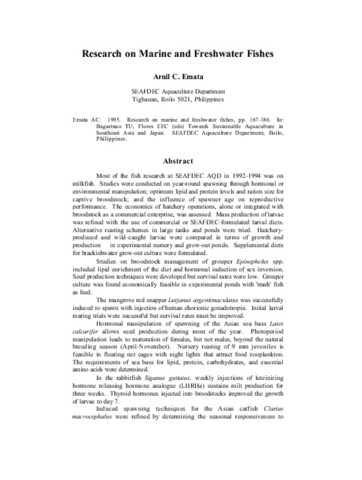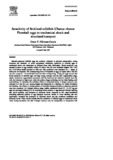Mass mortality of hatchery-reared milkfish (Chanos chanos) and mangrove red snapper (Lutjanus argentimaculatus) caused by Amyloodinium ocellatum (Dinoflagellida)
| dc.contributor.author | Cruz-Lacierda, Erlinda R. | |
| dc.contributor.author | Maeno, Yukio | |
| dc.contributor.author | Pineda, April Joy T. | |
| dc.contributor.author | Matey, Victoria E. | |
| dc.date.accessioned | 2014-05-08T03:55:14Z | |
| dc.date.available | 2014-05-08T03:55:14Z | |
| dc.date.issued | 2004 | |
| dc.identifier.citation | Cruz-Lacierda, E. R., Maeno, Y., Pineda, A. J. T., & Matey, V. E. (2004). Mass mortality of hatchery-reared milkfish (Chanos chanos) and mangrove red snapper (Lutjanus argentimaculatus) caused by Amyloodinium ocellatum (Dinoflagellida). Aquaculture, 236(1-4), 85-94. | en |
| dc.identifier.issn | 0044-8486 | |
| dc.identifier.uri | http://hdl.handle.net/10862/2010 | |
| dc.description.abstract | Outbreaks of heavy infestation by the parasitic dinoflagellate Amyloodinium ocellatum in hatchery-reared milkfish (Chanos chanos) and mangrove red snapper (Lutjanus argentimaculatus) caused 100% mortality events in hatcheries in the Philippines. Parasites were recorded on the body surface in 14-day-old milkfish fry and on both skin and gills in 2-month-old snapper. Trophonts of A. ocellatum caused local erosions of fish skin and degeneration of epithelial cells at the sites of the parasite's attachment to the body surface. Separation and hyperplasia of gill epithelium and fusion of secondary lamellae at the distal parts of the gill filaments were common. High pathogenicity of A. ocellatum to fish may be attributed to the severe alterations of the fish gills, the disruption of the host's skin, and feeding of trophonts on hosts' epithelial cells. In-vivo treatments of A. ocellatum-infested snapper with a 1 h freshwater bath and 200 ppm H2O2 showed promising results. This is the first report of A. ocellatum infestation in milkfish and mangrove red snapper in the Philippines. | en |
| dc.description.sponsorship | This study was done under the Regional Fish Disease Project of Government of Japan-Trust Fund. We acknowledge Dr. Yasuo Inui and Dr. Kazuya Nagasawa for technical guidance, Albert Gaitan and Angelo Marte of Aquaspec Hatchery and Marietta Duray and Jhozine Damaso of SEAFDEC Fish Hatchery for providing the fish samples, the Microtechnique Service Laboratory of SEAFDEC Aquaculture Department for assistance in histological processing of the samples, and Dr. Evelyn de Jesus for editing an earlier draft of the paper. | en |
| dc.language.iso | en | en |
| dc.publisher | Elsevier | en |
| dc.subject | Amyloodinium ocellatum | en |
| dc.subject | Chanos chanos | en |
| dc.subject | Lutjanus argentimaculatus | en |
| dc.subject | Philippines | en |
| dc.title | Mass mortality of hatchery-reared milkfish (Chanos chanos) and mangrove red snapper (Lutjanus argentimaculatus) caused by Amyloodinium ocellatum (Dinoflagellida) | en |
| dc.type | Article | en |
| dc.identifier.doi | 10.1016/j.aquaculture.2004.02.012 | |
| dc.citation.volume | 236 | |
| dc.citation.issue | 1-4 | |
| dc.citation.spage | 85 | |
| dc.citation.epage | 94 | |
| dc.citation.journalTitle | Aquaculture | en |
| seafdecaqd.library.callnumber | VF SJ 0779 | |
| seafdecaqd.databank.controlnumber | 2004-11 | |
| dc.subject.asfa | ectoparasites | en |
| dc.subject.asfa | fish culture | en |
| dc.subject.asfa | fish kill | en |
| dc.subject.asfa | hatcheries | en |
| dc.subject.asfa | infestation | en |
| dc.subject.asfa | mangroves | en |
| dc.subject.asfa | marine fish | en |
| dc.subject.asfa | mortality causes | en |
| dc.subject.asfa | new records | en |
| dc.subject.asfa | noxious animals | en |
| dc.subject.asfa | parasitic diseases | en |
| dc.subject.asfa | parasitology | en |
| dc.subject.scientificName | Chanos chanos | |
| dc.subject.scientificName | Dinoflagellida | en |
Files in this item
| Files | Size | Format | View |
|---|---|---|---|
|
There are no files associated with this item. |
|||
This item appears in the following Collection(s)
-
Journal Articles [1261]
These papers were contributed by Department staff to various national and international journals.




